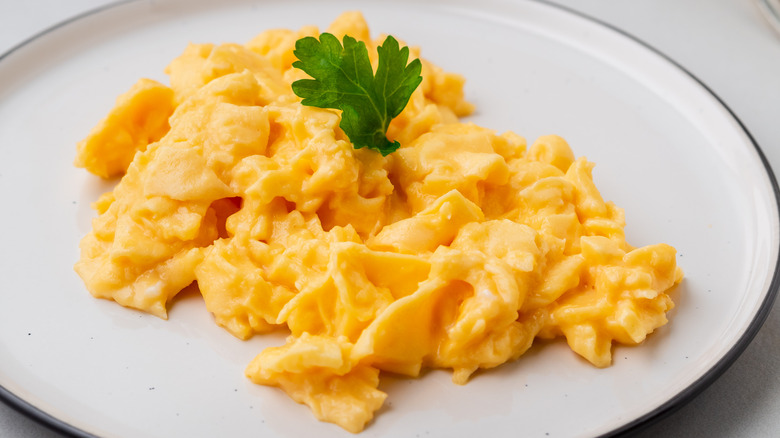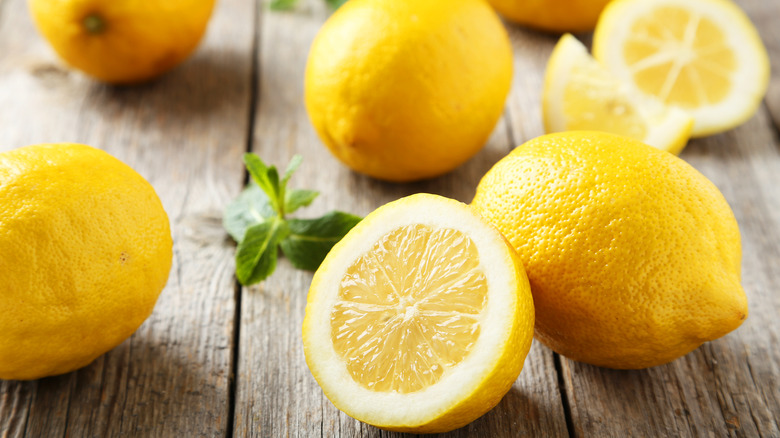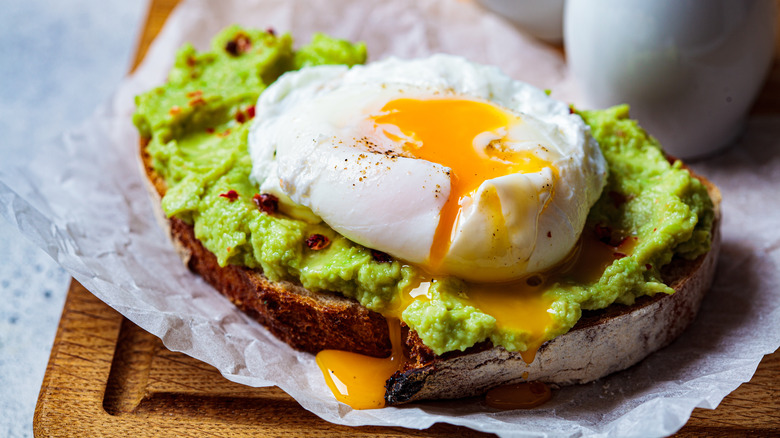The Key To Soft Scrambled Eggs Is A Little Bit Of Acid
We may receive a commission on purchases made from links.
Scrambled eggs is one of those dishes that seems incredibly simple, but can be tricky to get right. Everyone has their own preferred technique when it comes to how to make perfect scrambled eggs – from the best temperature to cook them to whether to add milk, cream, or butter.
But did you know that adding some acid could also elevate your egg game? Most home cooks are aware that a squeeze of fresh lemon juice can help to lighten and brighten the taste of many dishes, from roast chicken and vegetables to salad dressings and desserts. Well, it turns out that adding a little acid can also improve scrambled eggs. And it's not just about the taste; it can also help to produce the soft, comforting texture that we all crave from our eggs.
Often, when it comes to the reason why some kitchen hacks are so effective, it helps to look at the science behind how different ingredients work together. Adding a dash of acid alters the protein structure of the eggs as they cook, as well as adding more moisture for a fluffier, softer scramble.
Use lemon juice or vinegar to take scrambled eggs to the next level
Eggs are full of protein, with about half of it in the whites, and around 40% in the yolks (the rest lies in the shell and membrane). Acid alters the structure of these proteins, causing them to denature when heated at lower temperatures, and also helping them to coagulate yet stay soft. It also helps to make little air pockets within the scrambled egg. What this means, in practical terms, is that a little citrus juice or vinegar helps to keep your scrambled eggs super-soft when cooked over low heat — and makes them fluffier, too.
A squeeze of lemon juice is an obvious acid to add to scrambled eggs before they hit the pan for an extra-soft result, but you can also use different types of vinegar. White wine vinegar, as used in many hollandaise sauce recipes, works well, due to its milder flavor, but some chefs prefer sherry vinegar for its distinctive taste and aroma.
As for how much acid to add, try a teaspoon of lemon juice or vinegar to two eggs before you cook them, and then you can always adjust it according to your personal taste. To take things a step further, you could even try a squeeze of lemon or lime juice over the scrambled eggs once they're cooked, for a fresh, zesty, restaurant-style finish.
Acid can help with cooking other styles of eggs, too
It's not just scrambled eggs that can benefit from a little acid. Adding a teaspoon of vinegar or lemon juice to a pan of roiling water helps poached eggs to set better, and to maintain their shape while cooking, rather than the whites spreading haphazardly all across the pan.
When it comes to hard-boiled eggs, adding a little acid such as vinegar to the water helps the whites to set faster, and some say it can make them easier to peel, as an added bonus. This is because the vinegar weakens the shell, and alters the pH level of the egg, helping the white to come away from the shell more easily.
And vinegar can even help to elevate both the texture and taste of classic fried eggs, too. Eggs can be fried in water with a touch of vinegar, rather than oil, to eliminate the risk of overly crisp or burnt egg whites. As a finishing touch for extra flavor, French chef and restaurateur Roger Vergé famously topped his fried eggs with a pan sauce of reduced wine vinegar and leftover cooking butter in "Cuisine of the Sun." So next time you're cooking eggs, try adding a touch of acid to make them eggs-tra special.



